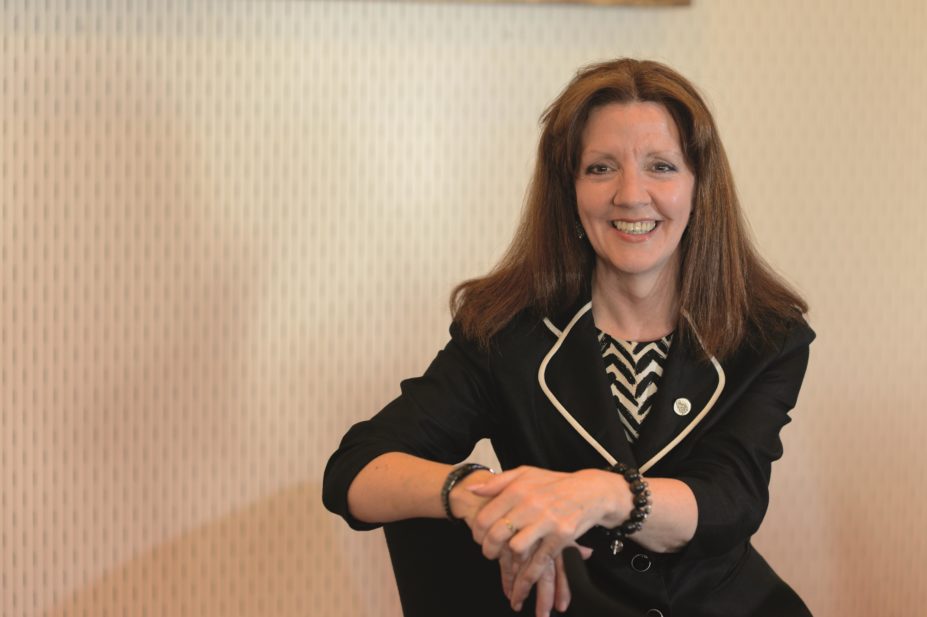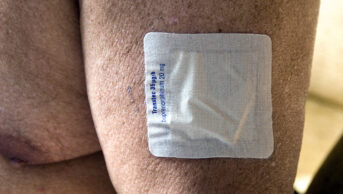
Simon Wright Photography / The Pharmaceutical Journal
We meet Rose Marie Parr as the global pharmacy world descends on Scotland for the 2018 International Pharmaceutical Federation Congress.
It is a big event, with more than 3,000 delegates in Glasgow over five days, and, as Scotland’s chief pharmaceutical officer, Parr is keen to show how her big plans for pharmacy are going.
Unlike some other areas of the UK, pharmacy in Scotland has a clear blueprint for the future. In 2017, Parr released a 60-page document called ‘Achieving excellence in pharmaceutical care: a strategy for Scotland’. In it, she promised to “transform the role of pharmacy”, launching schemes to place more pharmacists in GP surgeries, allow community pharmacists to prescribe for minor ailments and deploy technology for pharmacy to reach more rural communities.
There are signs that pharmacy in Scotland is finally being given the recognition it deserves, but what has happened in practice? The Pharmaceutical Journal caught up with Parr to find out.
It’s been a year since ‘Achieving excellence’ — how far are you into implementing it?
That’s a really good question. Since it’s been released, it has been about building on and developing our core services, so there were never any big surprises. We want to encourage people to use community pharmacies as their first port of call, and so we are looking at how we might redesign our minor ailment service to try and do that. We also have to keep building on our Pharmacy First service so that all pharmacies across Scotland are able to have a bit more armoury.
Pharmacy First is a service for treating uncomplicated urinary tract infections and impetigo in pharmacies. Are you looking to broaden that?
Yes. We’ve got some good feedback to show that maybe up to 90% of referrals can stay within the community pharmacy and maybe only 10% will go elsewhere. Early days yet, but it looks really impressive. We have also extended our minor ailment service, an evaluation of which is expected to finish soon. What we want to do in the future is bring in more common clinical conditions so that pharmacists can look at quite high-level issues clinically and be able to prescribe for them either generally, or under a patient group direction. That would be our direction of travel — we just need to do some work to do that.
So, the pilot of extended minor ailments in pharmacies to all patients — what did that find?
Well, it’s not in the public domain yet, but we see good news. It looks as though patients like this — it’s easy access, they understand the skills of pharmacists and it’s much better than having to go their GP, particularly those with uncomplicated urinary tract infections (UTIs). Some of that feedback is very positive. And I think GPs have also found it good that they can refer to community pharmacists. So that’s been a good thing for us to look at and we will later build on that as we go forward.
Are you looking at rolling this out?
We need to look at what that means if we are looking at minor ailments in an extended manner to the whole population of 5.6 million — what does it really mean for the service and for capacity terms? How is that rolled out? So we need to look at that in the next couple of months. [The Scottish government has subsequently confirmed that it will roll out this scheme nationwide.]
In England, minor ailment services are being taken away from pharmacy and you’re looking at extending them. Why do you think that is?
We want to take the extension of minor illness and redesign it so pharmacists are able to, on the high street, look at common clinical conditions. So it’s not just about minor ailments but it’s much more about things like UTIs — for female uncomplicated UTI problems — where we actually know by proxy that patients don’t need to go to the GP. Our philosophy is trying to make the community pharmacy the first port of call. The other commitment for community pharmacy is also looking at public health and how we can make that better. Standard public health services can be extended; sexual health services could be extended. Pharmacies — there are 1,257, I think, on the high streets in Scotland — are well placed, not just for opportunistic advice, but also for treatment, so we need to build on that.
How can you change patients’ expectations so they know that it is the first port of call?
That’s a really good point; we’ve had that from some of our politicians as well. We need to get that message across better to patients and the public, and, in particular, to young people who can quite easily take pharmacy on board. We’ve seen some evidence from university campuses that the first point of call is going to be community pharmacy. I don’t think they would go to their GP if they didn’t need to.
A recent campaign by RPS Scotland has been explaining to patients that if a pharmacist talks to them about their medicines, they are trying to improve their care. What do you think about that?
There is a whole thing about valuing medicines as well. How do we treat medicines and value them so that we can understand that we can have absolute benefit, but also that there are harms as well. There’s something about using the pharmacist’s expertise to try to talk people through that. There’s a lot of information out there, but sometimes there isn’t a lot of intelligence.
So, you are halfway to getting pharmacists into GP surgeries?
Yeah, we are. We’ve had three years of working on that. We’ve got another three years to go. And at this point, we’ve got over 200 pharmacists who’ve been appointed and about 50 pharmacy technicians as well. So that investment in the first three years has worked well and we’ll have that similar investment again in the next year. We think that up to 50% of GP surgeries have a pharmacist or technician working with them.
You are on the rebalancing board. Where is its work in terms of technicians being given more responsibility to supervise the sale and dispensing of medicines?
It can polarise people within the profession and we just need to keep that discussion going. There’s something about us being more flexible to allow us to work at a higher level. You hear all this talk about working at the top of your licence — I think pharmacists and technicians need to do that. If it is about looking at accredited technicians, then that’s what we should be doing.
Talking about careers, what are your thoughts on the suggestion of a foundation programme after preregistration training?
I’m very supportive of that. Early years support is vitally important; it’s where we cut most of our clinical teeth and build our competencies. If we make mistakes, then we need to be supported. We’ve started some work in Scotland but it would be much better to do that on a UK basis, so I’m very supportive of it.
I recently saw a report from The Scotsman detailing a £60m NHS spend on paracetamol in Scotland. In England there have been some moves to restrict access to over-the-counter medicines. Could you see that happening here?
It’s a good question, but the wrong end of the telescope. As long as the prescribing is effective, efficient and safe — that’s the important bit. If a pain threshold is very low, then what’s next? So perhaps more opiate-based prescription drugs would be used and that might cause more problems? So there’s something for me about a clear, strong prescribing strategy on pain, which we have in Scotland.
So you wouldn’t want a barrier to prescribing medicines like paracetamol?
No, barriers would be difficult. There are some people who can’t have access to that type of medicine, or they might not be able to afford the quantity that they need for a long-term condition. I think it’s much more about personalised, safe and effective medicines.
I just wanted to touch on the patient safety programme — transitions of care is an area you are looking at.
We want to see a better interface between hospital, primary care and also community pharmacy and we’re building on some of that. We’ve got some hospital electronic prescribing systems that are being rolled out across Scotland just now — obviously not fast enough — but we need to keep pressing on that. And we also have some good pilot work around community pharmacies being in touch electronically with GPs and vice versa. We’re absolutely not there yet, but we can see the building blocks of that happening. We need to work harder around community pharmacist access to patient records, so that they’re not prescribing or doing things blindly, they’re doing that with the best information possible. And we are working on that with our colleagues in primary care, policy, Scottish government, and also with our GP colleagues to try and make that happen — and it will happen.
Is that close?
It’s close. We have agreed with our GP colleagues an over-arching governance framework, so now our policy colleagues in primary care and government are looking at it. I think it will be soon, certainly within the term of this government. The political will is absolutely there. For me, it’s a patient safety issue.
Are you worried about Brexit?
From a Scottish government point of view, I would say that Scotland didn’t vote for Brexit. It doesn’t want to be in this position. There’s something there about how we safeguard both the pharmacy workforce and medicine supply. Brexit in that aspect is reserved — we are part of a devolved nation. We’ve had conversations with Department of Health and Social Care colleagues and we continue to do that. We have had frequent conversations about protecting medicine supply.
Are you happy everything is being done to ensure the medicines supply will be there when Brexit rolls around in 2019?
We continue to work with our colleagues to do that. Medicines supply is a big issue, even before Brexit. It is a worldwide global issue and there’s something about how we look differently going forward so that medicines aren’t seen as a commodity, but as a healthcare right.
Lastly, the Conservative Party in Scotland was talking about 24-hour pharmacies recently. Do you support that?
I don’t feel there’s an appetite for that in Scotland. I don’t think that our contractor colleagues would think there would be a business model to support that either. We do have good pharmacy access across Scotland on weekends and evenings. I suspect we just need to keep in touch with our out-of-hours colleagues and NHS 24, and how best we build on the work that is already there.


